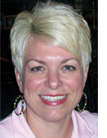by Bryn Hamilton, RD, LD
 Weight loss often occurs quickly and steadily for patients the first year after weight loss surgery. During this time, the scale is something most people become very accustomed to. They are weighed by their surgeon at post-op visits. They are weighed by their primary care physicians when they have appointments to come off medications for their now previous high blood pressure, previous diabetes, and other previous obesity-related health problems.
Weight loss often occurs quickly and steadily for patients the first year after weight loss surgery. During this time, the scale is something most people become very accustomed to. They are weighed by their surgeon at post-op visits. They are weighed by their primary care physicians when they have appointments to come off medications for their now previous high blood pressure, previous diabetes, and other previous obesity-related health problems.
Many patients frequent their home scales between visits and continue the tradition of daily or multiple times per week weighing. Others, however, find sustained weight loss success without using a scale.
OH members who choose not to weigh at all or who weigh only once in a while offer the following:
• "I use other indices now – the fit of my clothes – improved performance in the gym as better indicators of how I’m doing. I want wellness... not just thinness...and until I got there – the scale had too much power."
• "Remember that fluid, hormones and other unknowns can influence the scale. Give the scale to a friend, neighbor, family member etc., so that you don’t have the scale in your house to be obsessive with."
• "Weight can fluctuate daily. Don’t set yourself up for failure."
• "Being obsessed about weight will make you and those around you crazy, so give yourself the gift of moderation. You can do it. This whole journey is about learning new habits. This is just one more step on the path."
When I work with patients after weight loss surgery, I encourage them to figure out what is best for them in terms of whether or not they weigh themselves, and if so, how often. We discuss the fact that what is important is making sure they are getting the nutrition they need through healthy, consistent meals and vitamin supplements. So long as they maintain their weight loss and remain at a healthy weight for them, whether they actually set foot on a scale is irrelevant.
I discourage patients who become traumatized by a pound or two of weight regain from weighing more than once a week at most. Not using a scale may be the best option for them. It is important for these patients to track their food intake and exercise in order that they maintain a realistic view of what they are consuming. If they are following the post-surgical eating guidelines and are exercising, their weight should remain consistent after they have reached their healthy weight. They can also determine the status of weight gain or loss by how their clothing fits.
An important tidbit for people to remember is that even though the number on the scale may seem "stuck " for a short time (in other words, when they hit a plateau), their body is likely continuing to slim down. As they exercise, their shape is going to change and their clothing sizes will decrease, but their actual weight may not change. For those choosing not to weigh themselves, they won’t get scared or frustrated as they won’t know the scale is "stuck" and they will go merrily along appreciating the fact that they look and feel better and are wearing a smaller size.
A wise OH member said it well, "The body is always in an ever-changing and dynamic state. It is continually striving for balance. While we are drastically changing our daily lifestyle, activity levels, and meal plans, our body is trying hard to accommodate. The numbers do not always tell what is going on behind the scenes. "
In addition, I teach patients not to judge or criticize others’ choices about the scale debate. I remind them that it is not a matter of "right "or "wrong " but a matter of what works for each individual.
As one member noted, "I think everybody is different and if weighing yourself often affects your mood you should put the scale away for awhile. " It is important that patients support one another as they are all working toward the same goal: a sustained healthy weight and a fuller life.
 Bryn Hamilton RD, LD as been a Registered Dietitian for nearly 22 years and has worked exclusively with bariatric patients for the past seven years. She is certified in Adult Weight Management by the American Dietetic Association.
Bryn Hamilton RD, LD as been a Registered Dietitian for nearly 22 years and has worked exclusively with bariatric patients for the past seven years. She is certified in Adult Weight Management by the American Dietetic Association.
Related Content:
Scale Obsession
Weight Loss Surgery Success Without The Scale
Share your thoughts about success without the scale below!


